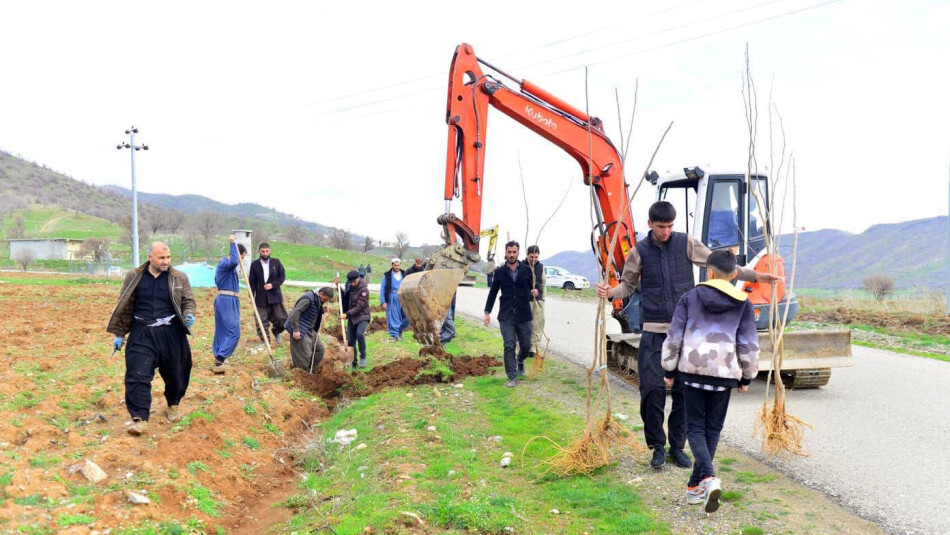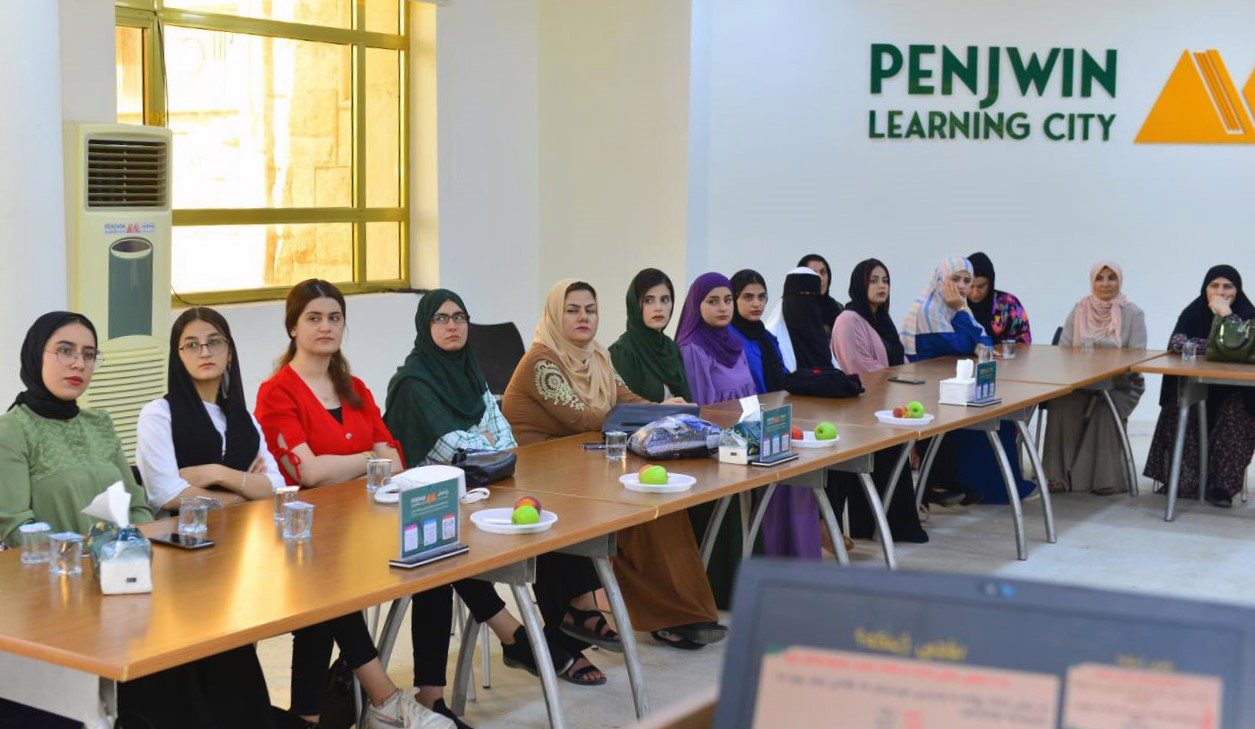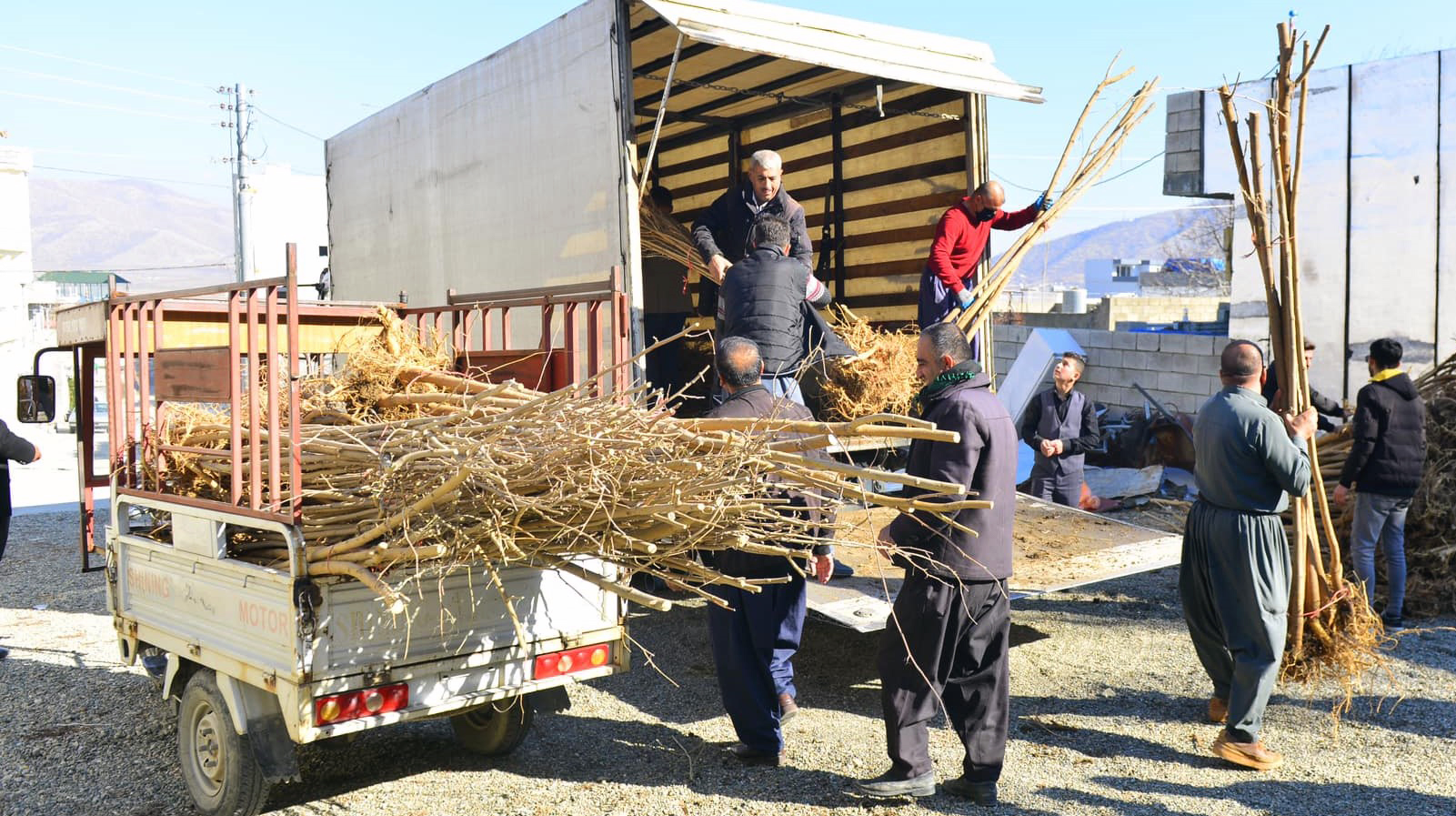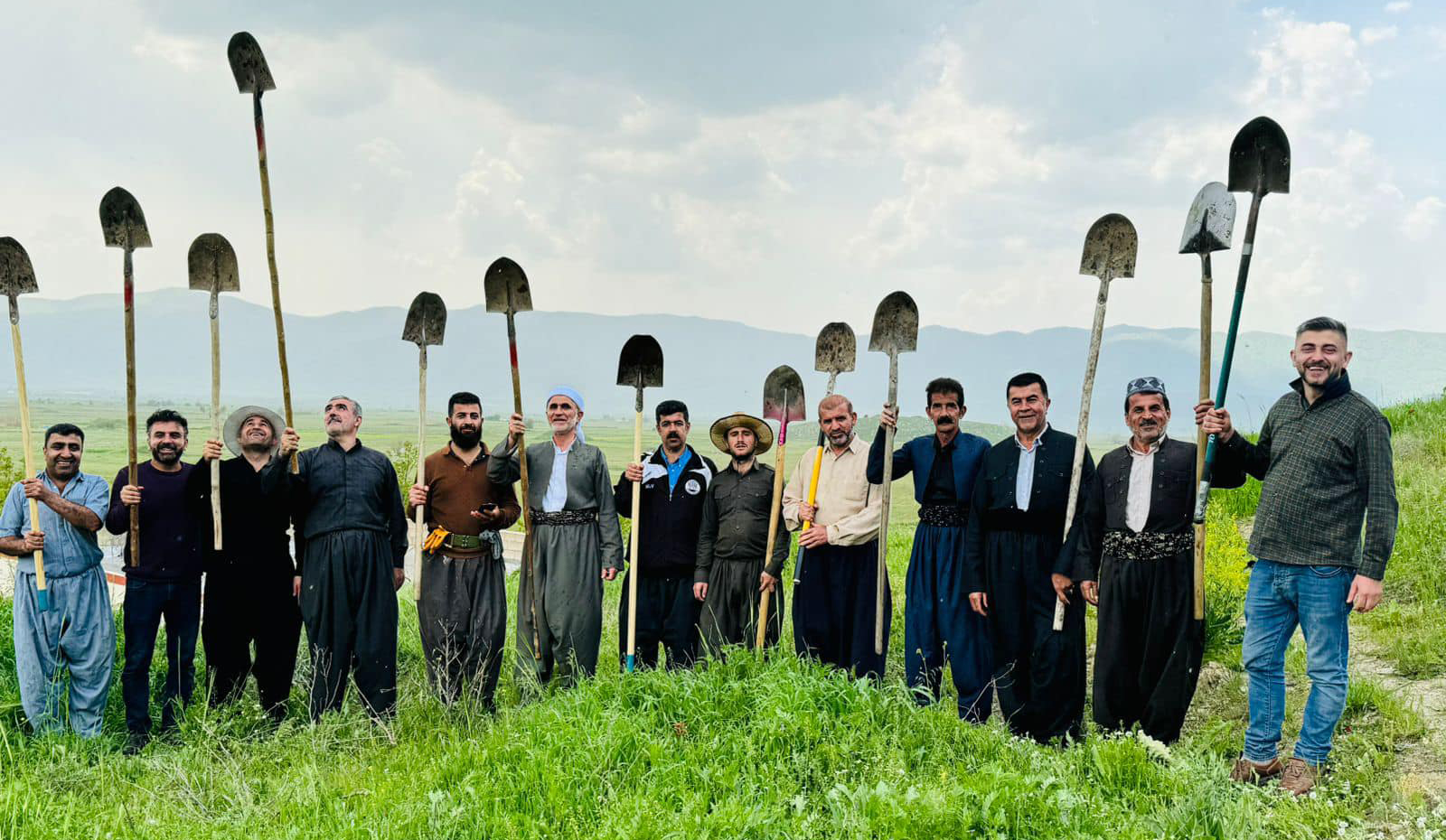
Anything linked to the environment, the Penjwen voluntary group must have a hand in it; including public awareness raising and tree planting campaigns. Over a couple of years, the group has planted more than 31 thousand mulberry trees which the population in Penjwen now enjoy their benefits.
These activities are being conducted under a project called (Penjwen Learning City), which was launched with the support of a number of businessmen, with hundreds of volunteers now taking part in.
“When we plant these trees, our goal is to protect the environment and restore the natural forests which burned or died”, says Gharib Penjweni, a cleric and one of the supervisors of the project. “Such projects are designed to improve air quality and to provide comfort for citizens, therefore we chose to serve in these fields”.
Penjwen district, located east of Sulaimaniya city, is known for its fertile agricultural landscape. The district includes two sub-districts in addition to around 200 villages. According to the Kurdistan Region’s Statistics Office, its population is estimated to be 53 thousand people.
A lively start
The idea of (Penjwen Learning City) project dates back to the year 2022, it was widely known as an educational and environmental project.
Zana Rahman, supervisor of the project said the project has a range of various activities on its agenda, including the environment and increasing green spaces, “so far we have planted 31 thousand mulberry trees. We chose this tree because it is drought-tolerant and can with stand extreme hot and cold weather.”
Most of the trees bore fruit and people started to pick this year.

Providing information about the environment and agriculture is another part of the project activities. “Collecting batteries is a campaign to serve the environment, with more than 500 kilograms been collected,” Zana added that they plan to expand their activities to reach other parts of the Kurdistan Region.
According to studies published by the United Nations, trees and greenery mitigate the impacts of climate change and reduce the emission of carbon dioxide.
Gharib Penjweni said, “We have planted trees along tens of kilometers of roads outside Penjwen, the majority of the trees bear fruit which people benefit from”.
There are different types of mulberry trees, some of them grow without human intervention. Mulberries are fast-growing when young, and can grow to 10 to 20 meters, but its growing pace gradually slows down. The fruit of the tree can be eaten fresh or dried or can be used to make juice, jam and other products.
Penjweni said that technology and human greed have negatively affected the environment, “The environment is everyone's home, and it is everyone's duty to protect it. Everyone should undertake responsibility towards the environment the same as he does towards his own home.”
Penjweni, who supervises tree planting activities added that they can, through taking care of the environment, face all the diseases which are spreading in Iraq and Kurdistan Region, since most of these diseases are due to pollution.
Namam (Plant) group was established in Penjwen in 2018, the name of the group was later changed to Drakht (Tree). The group has become part of the Penjwen Learning City project, and has intensified its activities over the past four years lunching tree planting campaigns in the center of the district and its surrounding villages. Around 170 volunteers have joined the group so far. There is also another group called Mlakwa Organization which focuses its efforts on publishing environmental awareness.
Rukhsar Nuri, an environmental activist said, “The environment means life, anything you eat, hear or live in represent the environment, the environment requires action, and action means religion, so the environment is equal to religion, this is how I see it”, she encourages the promotion of public awareness, particularly at schools.
The initiative has taken education and children into consideration, with courses on environment protection held in the summer, where participants are awarded the “Friend of the Environment Backpack” at the end of the course.
“Women are playing a good role in environmental issues and are cooperating with relevant organizations. They take care of the environment the same way they take care of their children. They start from their homes and then protect the nature outside,” according to Rukhsar Nuri.
Free trees
Tree planting within the project is carried out collectively, anyone who desire to take part would be offered trees for free, on condition that they take care of them.
According to the instructions set by the supervisors of the project, any citizen who receives 1-3 trees should promise to take care of the trees and provide information about the location he/she intends to plant them.
Yadgar Mahmoud, supervisor of the (Penjwen Learning City) project media said, “more than 41 thousand trees have been planted in different parts of Penjwen, many people take care of the trees, but some of the trees suffer neglect.”
The person behind the initiative, Habib Kani Shabani, a businessman from Penjwen, coordintes with local authorities in Penjwen to determine locations for the tree planting campaigns or other activities related to the environment.
“Previously, Habib himself was planting mulberry trees in the town, and now he supervises the project along with other members of the group”, Yadgar Mahmoud added that this year he participated in an international conference of learning cities held in Saudi Arabia, noting that they plan to join the list of learning cities selected by UNESCO.
Some of the trees planted are being named after famous Kurdistan Region personalities, a photo of the tree and its location is later sent to the those personalities so that they would visit it and take care of it whenever he comes by.
Gharib Penjweni indicated that they import thousands of trees from Iran annually, some of them are planted by the group and some are offered to locals for free, “besides the environment and tree planting campaigns we also conduct activities on education, awareness-raising and social peace”. Tasks are distributed among the group members, which include giving instructions to farmers to help them deal with agriculture problems and familiarize them with feasible farming techniques.
A voluntary service for all
All members of the group are volunteers, and the task of watering the trees is undertaken by two workers who use mobile water tanks, according to the project’s media director.
The trees are being watered according to a timetable, the process is mostly done in the evening. Every one-year-old tree is watered once a week, the two-year-old trees are watered every 12 days.

Sulaimaniyah/ 2024/ Distributing trees on locals in Penjwen for free Photo: Drakht “Tree” Group
Using a mobile tank, Sardar Sabir, is responsible for watering five thousand trees, according to a timetable starts from May until the end of June. Watering all the trees needs 13 water tanks the capacity of each is 15 thousand liters.
“Some of the trees were planted at the beginning of the project and have now grown and bear fruit which people benefit from,” according to Sardar.
Trees play the role of air filters, as they purify the air from toxic gases, dust and smoke, in addition to their other environmental benefits, according to studies published by the United Nations UN.
Bakhtiar Ali, deputy head of Mlakawa Orgnization for Protecting the Environment says that “it is necessary to fight for the environment, culture and identity, given that everything is connected to the environment, even if the projects were not that big. Generally people are cooperating with us, however work on environment issues is moving in a slow pace and is being marginalized”.
“Few people care for the environment”, as Bakhtiar complained, adding that “the government is also neglecting this aspect, what is being done does not is not enough considering the dangers facing the environment”, despite that the environment has hundreds of friends out there.
According to UN statistics, Iraq has been named the fifth-most vulnerable country to climate breakdown, affected by soaring temperatures, insufficient and diminishing rainfall, intensified droughts and water scarcity, frequent sand and dust storms, and flooding.
Sardar Ahmed, director of Penjwen Forest Protection Police, talked about the cooperation between environmental organizations and the government, mentioning Mlakwa organization as an example, “they are very cooperative… when fires erupt in the forests or pastures or people cut down trees, they soon inform us”. Sardar indicated that they have coordination with all other organizations operating in Penjwen.

Sulaimaniyah/ 2024/ Members of Drakht Group after conducting a tree planting campaign to increase green spaces in Penjwen Photo: Drakht “Tree” Group
So many challenges
There is no wholesale market for fruit and vegetables in Penjwen, therefore many farmers have installed wood huts along the town’s main roads where they sell their crops, “some of the trees have been uprooted with bulldozers”, said Gahrib Penjweni, a supervisor of the project.
Trees are burnt due to different causes, sometimes farmers deliberately burn trees which are close to their agricultural land, “although every year some measures are taken to avoid wildfire such as spraying the weeds around the trees”, Gharib added that “some people undermine our efforts on purpose and destroy the trees we have planted”.
According to the latest consensus conducted this year in Iraq, the rural population in the Kurdistan Region is estimated at only 16%, a fact which Gharib Penjweni consider another problem in addition to the destruction caused by livestock which feed on trees planted along the roads.
The Kurdistan Region Board of Environmental Protection and Improvement urges the protection of greenery and warns that people involved in cutting trees face legal consequences include a 500 thousand Iraqi dinar fine and imprisonment for three months.
The head of Penjwen Forest Protection Police said they ensure that the trees are protected after they are planted, “these trees add beauty to the town and it is our duty to protect them”.
Inadequate financial support is one of the challenges hindering the expansion of environmental projects. The deputy head of Mlakawa Organization says that they have planned to print and publish environment-related books and booklets and hold artistic activities, but their plans failed due to the absence of financial support. Bakhtiar Al said, “Some people react illogically to our activities and stand against them, they even filed complaints against us”, yet what matters for the group of volunteers is watching a tree growing.